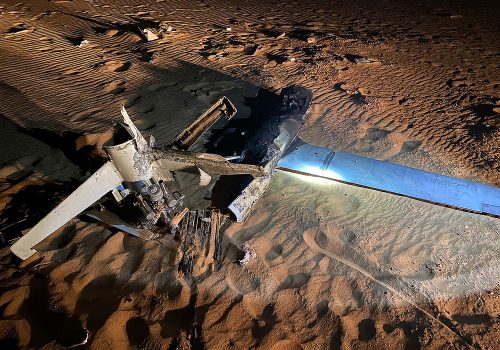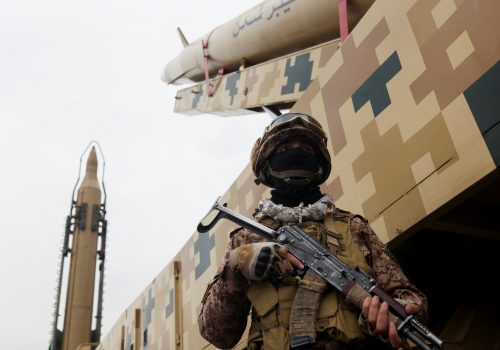Six big questions about US-led strikes against the Houthis, answered
The January 11 US-led strikes in Yemen reflect the culmination of a grave miscalculation on the part of the Houthis, who have been attacking shipping vessels in the Red Sea for weeks. The path to substantial military action by US President Joe Biden was clear. Here’s how he got to yes.
US government statements are very clear about the international legal justification for its military actions in the Red Sea defending freedom of navigation, an objective laid out on page forty-five of the Biden-Harris National Security Strategy and the national security strategies of US administrations since 1987. US spokespersons stress that each US action to intercept a missile or drone or to sink a boat has been an act of self-defense, per Article 51 of the United Nations (UN) Charter.
But statements about US thresholds for military action are more ambiguous. The Houthis believed that the US redline for offensive action would be the killing of an American. They also believed that Biden would be loath to engage in offensive military operations in an election year. Both were a misread in the current context. The Houthis assessed that the United States would strike only if a US asset were targeted, and then only with countermeasures.
However, the existence of an international coalition supportive of military intervention to disable the Houthi capability to endanger global shipping lanes shifted both the US redline for action and the willingness of the US president to act. A joint statement released on January 3 by Australia, Bahrain, Belgium, Canada, Denmark, Germany, Italy, Japan, the Netherlands, New Zealand, South Korea, Singapore, and the United Kingdom warned the Houthis against further attacks on international shipping in the Red Sea but did not define consequences for ignoring this warning.
This allowed the Houthis the interpretive space to believe staging a follow-on attack using munitions from a distance would result only in the targets being protected but would pose no risk to their lives or assets. The US Central Command statement issued January 9 after the latest barrage of Houthi missiles and drones simply repeated the warning. However, in this case, it was not a warning to Sana’a but rather as a statement of justification for what was about to happen. On January 11, the US military, backed by international partners, conducted limited strikes against Houthi ballistic missile, cruise missile, and drone storage, production facilities, and launch platforms.
Despite the gripes of some members of Congress, Biden was on firm legal ground to launch the strike. The Houthi spokesperson’s statement on January 9 that their just-completed missile and drone assault targeted a US ship providing support to Israel removed any ambiguity about grounds for a US response. Article II, Section 2 of the US Constitution allows Biden, as Commander in Chief of US Armed Forces, to direct action against immediate threats like the Houthi tools of assault without Congress deliberating and declaring war. In the case of both international and US domestic law, the ongoing imminent threat from the Houthis gives the US president authority to act when and if he feels it is wise.
Biden’s biggest pre-strike questions
Ahead of authorizing the strikes, Biden had to carefully consider arguments for and against conducting strikes to limit the Houthis’ capacity to continue waging war on international shipping. Here are the big questions to grapple with.
1. Will striking Houthi military assets result in further military escalation in the Red Sea and the region?
US strikes against Houthi military assets will not stop Houthi acts of war. On the surface, therefore, it appears to be a cut-and-dry argument against Biden taking military action. But would not striking Houthi military assets have resulted in otherwise avoidable escalation? Yes.
The Houthis do not need provocation for further escalation. In the absence of strikes against them, they continued to escalate their attacks on global shipping interests, as evidenced by January 9. Defensive action only has not deterred their escalation.
Will the US strikes against Houthi military assets stop Houthi attacks against Red Sea shipping? No. Will such strikes reduce the Houthis’ ability to continue the assault for as long or to inflict greater damage than without strikes? Probably. Would not reducing Houthi arsenals in response to their actions encourage further attacks on global shipping? Yes.
Tit-for-tat strikes against Houthi munitions and launchers will not end the Houthi involvement in the conflict. However, they could deplete Houthi capabilities to extend or intensify their military actions.
Sign up for the This week in the Mideast newsletter
Hezbollah is considering a land buffer agreement in its exchange of fire with Israel. The group has nothing to gain from an all-out war with Israel. It could inflict serious damage, but ultimately, the United States would come to Israel’s aid, and Hezbollah would be outgunned. In the process, Hezbollah would expend its arsenal, much of Lebanon’s infrastructure would be destroyed with Hezbollah to blame, and the group would lose ground in terms of its objectives. Hezbollah can appease those in its base clamoring for the group to show off its renowned store of weaponry as well as Lebanese citizens who prefer that their country stay out of the war next door by signing the agreement senior White House adviser Amos Hochstein is shepherding while retaining the capability to reach into Israel despite the buffer created by the agreement.
2. Do the US-led strikes jeopardize the fragile UN-led Saudi Arabia-Houthi talks?
In early December, the United Nations was presented with a draft plan for a political settlement to the nearly ten-year war between the Houthis and neighboring Saudi Arabia. Houthi political leadership appears focused on these negotiations while its military leadership fires on global interests in the Red Sea. The Houthis assessed that the United States and international community are so desirous of a political solution for this land and air war that they would not risk reacting to reckless Houthi maritime militancy.
Will the United States and the international community conducting strikes uniquely jeopardize the political negotiations? No—not any more than standard Houthi intransigence around these negotiations has for the past five years. Even as the recently proposed plan—approved by the Houthis as well as the Saudis—was presented to UN Special Envoy for Yemen Hans Grundberg, the Houthis were already registering that they would like additional concessions. Based on the Houthis’ past performance, it is safe to assume that if they acted as the spoiler to this plan, it was their predetermined intent.
3. Will the US-led strikes strengthen the Houthis in Yemen or abroad?
The Houthis are gaining popularity among Yemenis for their pushback against Israeli operations in the Gaza Strip since the Hamas attack on October 7, 2023. Could this translate to greater Houthi political popularity inside Yemen at a time when critical future political power-sharing decisions are being discussed? It is unlikely. The Yemeni populace backs political actors based on local and community interests. Houthi action elsewhere does not translate to adopting Houthi goals domestically, goals which include implementing a fringe religious sect’s view on how they conduct their lives.
From a broader counterterrorism perspective, the Houthis are applauded throughout the Muslim world for challenging Israel more robustly than other groups backed by the same Iranian flag. But this is unlikely to lead to global recruitment to their cause. Unlike al-Qaeda or the Islamic State of Iraq and al-Sham (ISIS) in years past, the Houthis do not espouse a global vision and cannot pretend to belong to a mainstream religious group. Houthi ideology is comprised of a political agenda controversially tacked onto the Zaydi branch of Shia Islam and calls for absolute obedience to a descendant of the Prophet Mohammed who should rule the entire Arabian Peninsula. Their current popularity is linked very specifically to their opposition to Israel’s war in Gaza and not to mass affiliation with this ideology.
4. Will the US-led strikes provoke Iran?
The answer is: no more than Iran is already encouraging such action. The January 3 joint statement warning the Houthis against further targeting of ships was extremely carefully worded: “The Houthis will bear the responsibility of the consequences should they continue to threaten lives, the global economy, and free flow of commerce in the region’s critical waterways.”
Tehran will note that the Houthis are singularly held accountable in this statement—and in the subsequent US strikes. That means Iran is off the hook. The US focus on these strikes allowed Iran to quietly carry out their two-year goal of retaking their oil tanker, the Suez Rajan, in the Gulf of Oman on January 11. There is no motive for Iran to underscore its ties to the conflict or the Houthis at this juncture. Tehran is already achieving its strategic goals with the decline of US popularity around the world and the halt of Israeli influence expansion in the Arab world through the Abraham Accords. Meanwhile, the distraction in the Levant allows the regime to focus domestically on broadening its nuclear program for greater future political leverage and shoring up its control of the population in advance of the eventual supreme leader transition.
5. Will the US-led strikes create reputational risk for the US on the international stage?
US support for Israeli military operations against the terrorist group Hamas has inspired criticism from countries with no connection to the conflict. The effort to build Operation Prosperity Guardian (OPG) on December 18, 2023 to secure the Red Sea was a test of the United States’ ability to build a coalition. The US military action conducted in the Red Sea is with the backing of OPG partners—some of whom have been quite critical of Israel’s actions in Gaza. This multilateral approach to threat assessment and planning tamps down cries about US unilateral action that risks impacting its reputation.
6. Will the US-led strikes harm Biden’s domestic political standing?
Biden’s biggest hurdle is his political party and Congress. He now has to worry about discontent among primarily Democrats about the humanitarian crisis in Gaza being mirrored in Yemen and his poll numbers dipping further. He also has to worry about opposition to the strikes from members of Congress who will vehemently decry an expanded US role in any sort of conflict in Yemen. Additionally, the president has to worry about opposition from members who fear kinetic action would suck the United States into another expensive war in the region. But with multilateral consensus for using military action to free a global shipping chokepoint impacting the flow of free trade, each of these risks are now reduced.
In the ring
The goal of taking action against Houthi military resources is to reduce the group’s ability to destabilize the region, threaten global shipping, endanger Israel and surrounding countries with poorly planned strikes, and protect civilians on land and at sea.
The Biden team is reviewing whether treating the Houthis as a legitimate political actor and a minor threat has emboldened Houthi militancy instead of encouraging their positive political evolution, and if so, whether it is time to prioritize a different objective. The United States has not redesignated the Houthis as a foreign terrorist organization but has enacted sanctions on individuals who facilitate their operations. The Houthis may not have imagined that the Biden administration would take military action without first a redesignation, and that was probably the case before the turn of the new year. However, the formation of a multilateral coalition in OPG and attempted Houthi strikes against US aircraft and a ship have altered the scenario and given Biden legal justification for the January 11 action without a protracted debate in Washington about designation. The Houthis wittingly took Biden’s gloves off for him, and he threw a punch.
Kirsten Fontenrose is anonresident senior fellow in the Scowcroft Middle East Security Initiative and former US National Security Council senior director for the Gulf.
Further reading
Mon, Jan 24, 2022
How the Biden administration can assure regional partners in the wake of the Houthi attacks on the UAE
MENASource By William F. Wechsler
US President Joe Biden is right to reconsider his previous decision to withdraw the US terrorist designation of the Houthis.
Wed, May 4, 2022
Iran-linked missile and maritime threats continue. Here’s how the US and its regional partners can bolster deterrence.
MENASource By Simon Handler
A shift in US strategy is needed to reestablish credible deterrence that denies potential attacks and punishes violations in order for the US and its partners in the Middle East to counter Iranian naval aggression and missile launches.
Fri, Jan 7, 2022
I’m the former foreign minister of Yemen. My country is starving and needs the international community’s help.
MENASource By Khaled H. Alyemany
The situation in Yemen cannot be permitted to continue on its current trajectory. The international community must act immediately to remedy its issues and change the country’s course from disaster to diplomacy.
Image: US Navy Arleigh Burke class DDG launching Tomahawk cruise missiles at Houthi targets in Yemen on Jan 12, 2024. The U.S. and UK militaries launched strikes against multiple Houthi targets in Houthi-controlled areas of Yemen on Thursday January 12, 2024.The military targets included logistical hubs, air defence systems and weapons storage and launching locations, marking a significant response after the Biden administration and its allies warned that the Iran-backed militant group would bear the consequences of repeated drone and missile attacks on commercial shipping in the Red Sea. (US Central Command handout/EYEPRESS)


